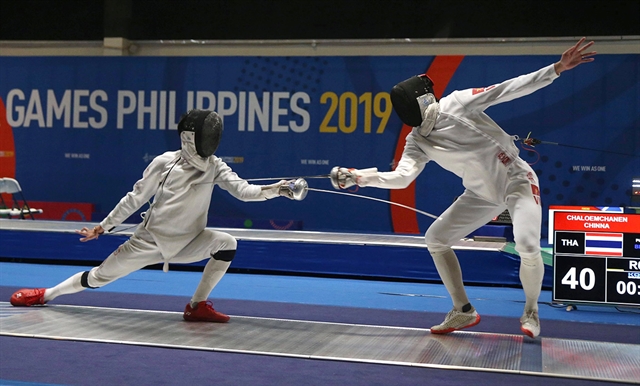
Vũ Thành An (right) competes at the 30th SEA Games in the Philippines in 2019. An is hoping to win an Olympic berth at the Asian Qualifying Tournament later this month in Uzbekistan. Photo tinmientrung.com
Fencing
Thanh Hà
HÀ NỘI — The COVID-19 pandemic has left Vietnamese fencers with a slim chance of qualifying for the Tokyo Olympics in July.
The fencers are aiming for one or two slots at the event, half of the figure of the previous Games. However, even that may be a tall order.
All eyes are on Vũ Thành An, who stands the best chance of being on the plane to Tokyo.
Per Olympic rules, Asia's top three fencers will qualify. An is currently in the top three and close to the point threshold to be second and automatically qualify. If he could have competed in at least five events in 2020 he would already have qualified, according to his coaches.
But due to the COVID-19 pandemic, An competed in only four and unexpectedly missed the recent World Cup in Hungary, the last competition with points on offer.
“An was No 3 in Asia in the March rankings. We were full of hope that he could lift his position up and advance to the Olympics because many powerful athletes did not compete at the Hungarian tournament as they had already won their slots. But he could not compete because of difficulties in visa procedures for Hungary in this COVID-19 situation,” said national head coach Phạm Anh Tuấn.
“Not participating meant that we lost our best chance.”
An’s last opportunity to make his second Olympics is at the Asian zone qualifying round in Uzbekistan later this month.
He will leave for the event on April 20 with five other teammates and coaches.
There will be six individual categories at the April 25-26 event and only the champion of each event will go to Tokyo.
Coach Tuấn said An (sabre) and veteran Olympian Nguyễn Tiến Nhật (epee) only had about a 10 per cent chance of winning in Uzbekistan.
“Although the tournament is for countries that do not yet have representatives at the Olympics, it is still really tough for us,” said Tuấn.
“For example, in An’s pool, there are no powerhouses from South Korea, Japan, Iran and China, but he will face at least six title candidates from Kazakhstan, Hong Kong, Australia, Chinese Taipei, Thailand and the hosts.
“As it is also the last chance for all, everyone is determined and will try as hard as we can.”
An is in his last stage of preparations for the event in Tashkent.
“The COVID-19 pandemic and long-term knee and ankle injuries have prevented me from carrying out many activities,” An told Việt Nam News.
“No intensive training or tournaments made my technique, tactics and competition feeling not as sharp as necessary. It will definitely affect my performance but it is only one of many challenges that I will have to overcome for the best result,” he said.
“Being considered the most likely fencer to take an Olympic slot is also pressure on my shoulders. But, I have become gradually familiar with the feeling after many years in fencing,” said An, the two-time Asian bronze medal winner.
Despite the odds being stacked against him, the four-time Southeast Asian Games champion was confident that he would succeed.
“We have had a new foreign expert coach for more than one year. He has brought a breath of fresh air to the team. We have learnt many new things from him. I hope that I can apply them in the coming matches,” the 27-year-old said.
An, who defended his national titles last November, said he does not know how many athletes will take part in his category but guessed that to reach the final he would fence in at least four matches.
“We know it will be tough but I am always encouraged and determined. And I also believe in my ability. I will take my slot, and things will go that way,” he said.
Việt Nam has dominated Southeast Asian Games fencing since 2011. They pocketed an individual epee bronze at the Asian Games in 2014 in South Korea two years before An’s Asian championship bronzes.
Vietnamese fencers first qualified for the Olympics in 2012 in London. Four years later, there were four representatives in both men’s and women’s classes in Rio de Janeiro. VNS
OVietnam